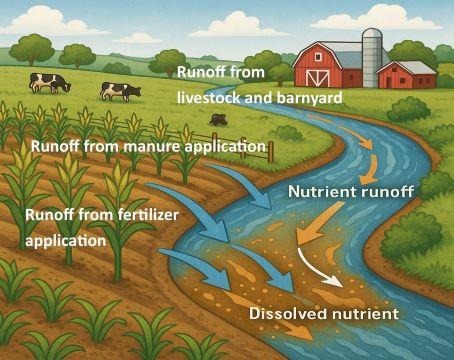
Groundwater (wells) and surface water (rivers, streams and lakes) are important sources of water for drinking and recreation in Latimer County. In recent years, reports of bacteria, nutrients, chemicals, and other pollutants in groundwater and surface water have increased concerns about our water quality.
Some of these pollutants come from non-point sources, which means there is not specific point of discharge, like from the outfall of a culvert or a leaking car. Rather the pollutants flow with stormwater overland and when that overland stormwater flows into a swale or ditch, it eventually makes it way to a stream or lake.
Non-point source pollution can originate from farms, livestock operations, equestrian centers, and other small acreages that fertilize fields, stockpile manure, or engage in grading operations. Below are some examples of pollutants that can originate from non-point sources.
Visit our Stormwater Quality Videos and Helpful Links pages and check out some of the resources featured there.
- Nutrient Runoff:
Fertilizers and manure used on farms, especially in small agricultural operations, can run off into nearby water sources when it rains. These nutrients, particularly nitrogen and phosphorus, can cause eutrophication (excessive algae growth), which depletes oxygen in the water, harming aquatic life.
- Pesticides and Herbicides:
These chemicals are often used to control pests and weeds in crops. When they are not absorbed properly by plants, they can be carried by rain or irrigation runoff into nearby rivers, lakes, and streams, where they can be toxic to wildlife and disrupt ecosystems.
- Livestock Waste:
Small-scale livestock operations can contribute significant amounts of waste to nearby water sources. Manure and urine from animals, when not managed properly, can leach into the soil and nearby water systems, introducing pathogens and excess nutrients.
- Soil Erosion:
In some smaller agricultural areas, poor land management practices can result in soil erosion, leading to sediments washing into nearby water bodies. This can degrade water quality by increasing turbidity (cloudiness), which affects aquatic habitats and makes it harder for plants and animals to thrive.
- Improper Waste Disposal:
If animal carcasses, waste, or leftover feed are not disposed of properly, they can contaminate nearby water sources. Additionally, some small farms may lack proper waste management infrastructure, increasing the likelihood of water contamination.

